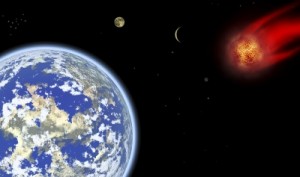Mining Asteroids: A New Frontier
It looks like there is a new promised land and it is not on earth. A consortium of billionaire investors have been planning to send robotic rockets to nearby asteroids to mine for water, precious metals and rare earth material. According to a recent article in USA Today, “The project is on a fast track. By 2014, the group plans to launch the first of a series of laundry-basket-size private telescopes that would search the asteroid belt for high-value targets.â€
The Mission
There are two incentives for mining asteroids. One is to reap materials such as nickel, iron, magnesium, platinum, metal cobalt and gold. It has been estimated in one NASA report that there could be a mineral wealth in a nearby asteroid belt of $100 billion dollars for each of the six billion people on earth. The second is to setup colonized and/or robotic fueling stations that can assist deep space travel. This means that in this asteroid belt that sits between Jupiter and Mars, manned space teams can stop to replenish their water supply and refuel with the same mined water turned into oxygen and hydrogen to create rocket fuel. In turn, the metal ore found can be used to build space stations as well as spaceship parts.
The Money Bags
Nowadays it only takes a few heavy hitters to fund projects such as this. It used to be a huge undertaking to get hundreds of small investors on board of such a mission but with recent individuals profiting in the billions one or two can run the whole thing. According to the Bellevue Washington based start-up company, Planetary Resources, a list of those involved include: former Microsoft executive Charles Simonyi, Google CEO Larry Page with Executive Chairman Eric Schmidt and Hollywood director James Cameron.
Predicted for Years
Such colonization and asteroid mining has been predicted for Centuries. Albeit, these predictions were met with skepticism and ridicule like so many forward thinkers (Galileo was put under house arrest for suggesting that the sun was the center of our Universe). Taken from “The Paradise Within Reach of All Men†by John Jacob Etzler, 1888: “…everything desirable for human life may be had by every man in superabundance, without labor, and without pay; where the whole face of nature shall be changed into the most beautiful forms, and man may live in the most magnificent palaces, in all imaginable refinements of luxury …â€. There was also the 1970’s Princeton Physics professor, Gerard O’Neill who envisioned self-sustaining colonies orbiting in deep space which included an employment draw of mining operations as well as internal climate conditions equivalent to “…quite attractive modern communities in the U.S. and in southern France.â€
Mining asteroids seems to be the beginning of a new frontier of deep space exploration. It very well may spawn an industry that catapults the United States and other countries into a much needed economic boom. Just think, your young children or relatives could someday be studying and training to spend years on an encounter in space.
